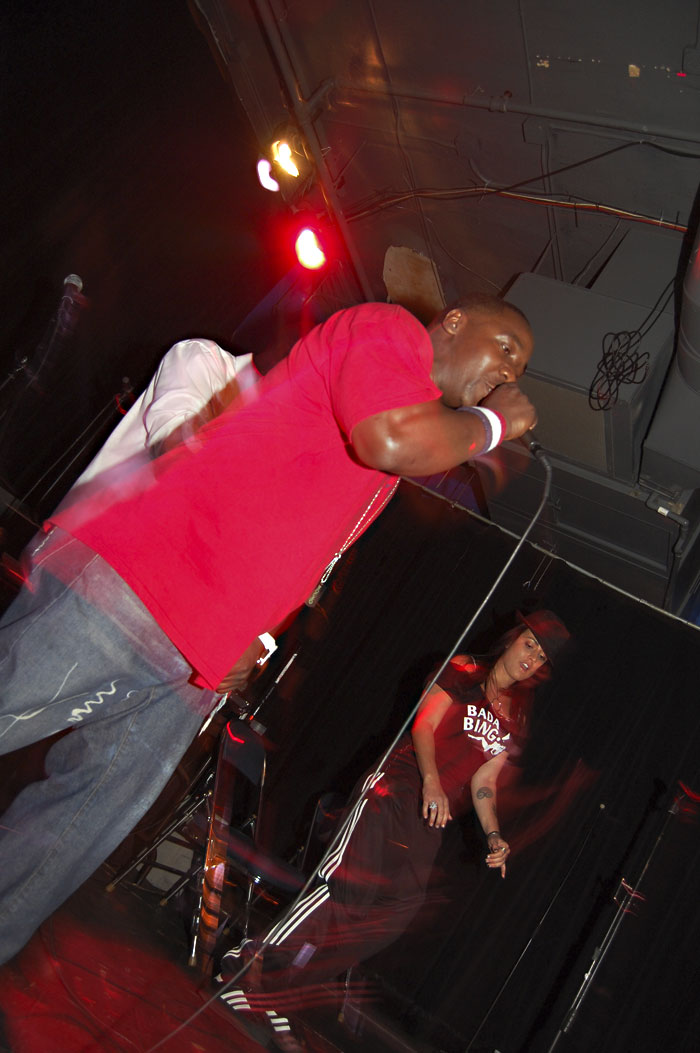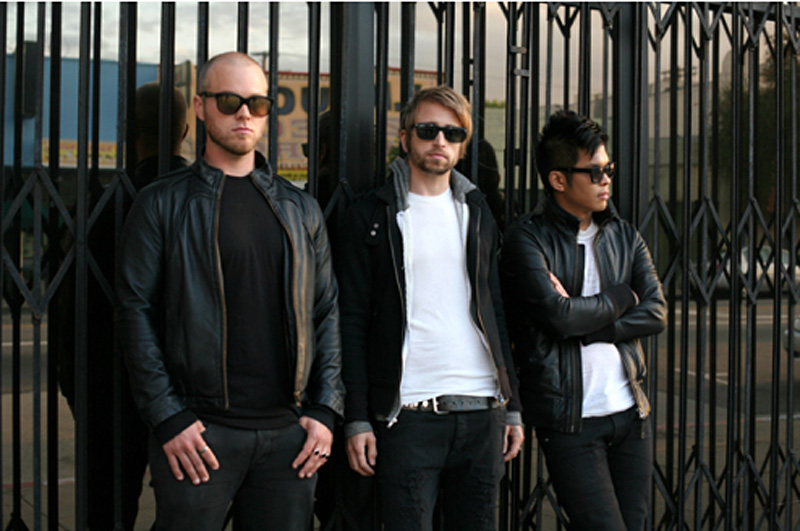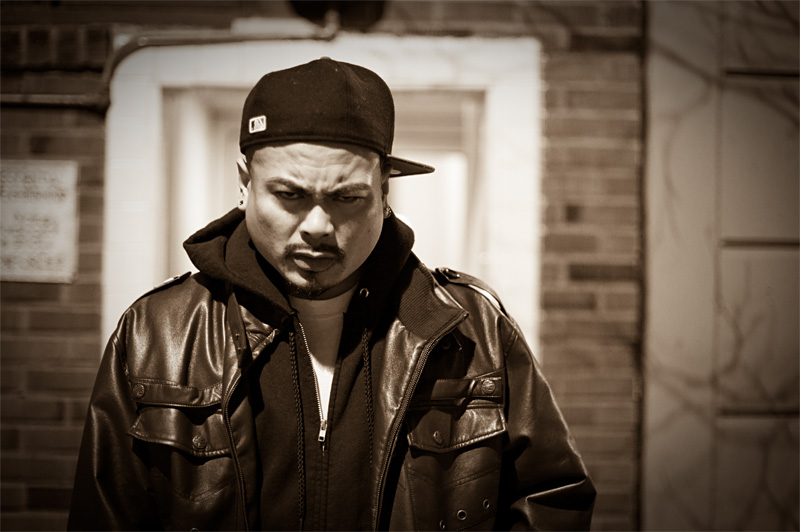Dressed in a blood-red T-shirt and fashionably tattered denim, Candidt–a fireplug of a man–stood on King Cobra’s stage last August with two other MCs and a DJ. From the outset, nothing suggested that this performance would be anything more than your average hip-hop show. And then the funky, bouncy bass of “Howww” kicked in, and Candidt sprang to life. “Party people say ‘Hooo! Hooo! Hooo!'”, he urged. The midweek crowd–which only minutes before had looked sapped of energy–passionately obliged. But better yet: MCs Brotha Brown (Candidt’s actual brother) and Von Op didn’t drown their fearless leader in clichéd shout-outs and yos. Instead they knelt on the stage, dropped some cash and dice . . . and proceeded to play craps.
This is what Candidt produces onstage: music videos. But the performance aspect points to more than just inventive showmanship. It also reveals the kind of understanding that comes with being a veteran practitioner and observer of hip-hop culture: If you want to be recognized, it helps to be different. And recognition is exactly what Candidt needs before he walks away from MCing forever.
“I feel like I’m in the fourth quarter and now it’s the time to game on it,” says the 35-year-old father of two. “Because the game is about to be over.”
This week, Candidt will release his latest effort, Sweatsuit & Churchshoes—the title a nod to the cultural push-pull imprinted on the MCs DNA. Candidt was born Joe Page in Seattle to a mother who maintained a household smelling of hard liquor and prostitutes’ perfume. Eventually, thanks to the state, he and his three siblings were pulled from that den of iniquity, only to be rescued by their grandmother, a disciplinarian whose parenting philosophy was built on religion. Through a mode of delivery he dubs “sticky flow”—herky-jerky utterances smoothed out via rapid-fire linkage—he evokes imagery of a pimp’s sweatsuit zippering shut alongside the squeak of a congregant’s church shoes. But you have to listen close, because, frankly, Candidt is more tricky than sticky.
“He goes in so many directions with his flow. It’s ridiculous,” says Roc’phella, one of the album’s producers. “If you listen to him, you really have to listen to his lyrics to find out what he’s talking about, because his vocabulary’s really intricate.”
The grinding, synthed-out production of the rough-and-tumble “Metal Lip,” courtesy of XP, provides a backdrop for Candidt to bend language to his will, lending credence to Roc’phella’s observation: “Negatives, positives—he’s reppin’ every inch/The game’s funky/He’s jonesing for the stench/This is Candidt’s court—sucka you in contempt/From Seattle to ATL we’re monster mashin’ this!”
Though Candidt employed XP, Roc’phella, and about a dozen other producers and guest MCs, the album is remarkably unified. From song to song, it’s the perfect amalgamation of hip-hop’s past and present. From Snoop Dogg (“Howww”) to Outkast (“Old School”) to Lyrics Born (“Goodtimes”), he recalls the greatness of numerous MCs even as he distances himself from them with his originality.
His style is muscular—ripped, really—and so self-assured that to call it confidence would be an understatement. And yet it’s so understated. Candidt breezes past you like childhood, leaving you with sensations and images and scraps of half-remembered but nevertheless meaningful experiences. Not many MCs, local or otherwise, can pull this off.
Onry Ozzborn of Grayskul—one of Sweatsuit‘s guest MCs and a man not given to hyperbole—says flatly: “If Candidt was heard by the top 10 record companies in the country, he’d have a million-dollar deal.”
Candidt claims Sweatsuit & Churchshoes may be his last swing at the stars, but it’s not his first. He’s put out four albums, all of which he refers to as “hood classics,” including 1996’s Dookiebraid Soul and 2002’s Dionices: Agony & Ecstasy. To varying degrees, both discs exhibit his fondness for dichotomy—for pinpointing and then extracting the dueling influences at work inside him.
“My situation in my life is too complex to take under one [genre]. There’s no way I can say, ‘Oh, I’m a gangsta rapper. Oh, I’m a backpacker,'” he says of his work’s shared themes, adding, “I’m 100 percent a lot of things.”
Those albums are strong, he says, even going so far as to say they rival the power of his current release. Indeed, Dookiebraid Soul landed him a deal with a London-based label called Lionfish Entertainment, marking his first and only major brush with solo success. But it fell apart before it could get off the ground. Candidt says “The only reason why it didn’t [happen] is the Lionfish company had some shady business going on. Shit hit the fan and it didn’t happen.”
Since then he’s played the role of a classic journeyman musician, content with a lower profile performing alongside others while plotting his next move. He worked the club circuit with local group DMS, and appeared on compilations and numerous albums by other MCs. Following the completion of his second release, Candidt began rapping with the nine-piece local band Goodybag. Then after it dissolved he joined another band, Molimo, which also dissolved for a time, though apparently the members are in the process of regrouping now.
In addition to making his own music, Candidt has served as a much-needed outlet for other local MCs. As promoter and founder of the popular live hip-hop showcase “The Corner” every fourth Friday at the Rendezvous, he fills a vital gap by providing lesser-known acts such as LaRue the opportunity to rock alongside better-knowns such as Grieves. “‘The Corner’ is the place for pretty much all the MCs to step through there, get their shine on for 20 minutes, a half hour, gain some fans, gain some confidence, and take that as a catalyst and step forward,” Candidt says. So if he doesn’t make it big like he wishes, he knows he’s got the experience and business acumen to nurture other artists as a manager or in A&R. “I just know what artists need because I’ve been doing it for so long,” he says.
But check the new album’s last cut, “Some Ain’t Never Been Nothin’,” and you’ll hear a guy not likely to give up easily. Hidden beneath a story of the perils of ghetto life is a manifesto that one could easily apply to his artistic aspirations: “Decisions consequences is based solely on your wisdom/Fail to rationalize, your trail could lead you to Hell—listen/Close to your culture’s whispers/Peep the picture, it’s ever-changing/Stuck up in neutral will leave you pained.”
“However I can get down, I’m ready,” he says. “Since Sony Records or MCA Records isn’t right down the street, I’ve got to hustle.”







